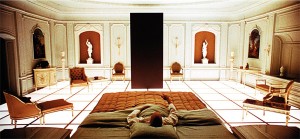I finally broke down and bought one of them newfangled iPad gadgets. Yes, make no mistake, it is a gadget, but I’ll have to admit, a rather useful one.
I had avoided one up until now because it wasn’t a computer. Sure, it probably has more processing power than anything that sent us to the moon, but it won’t run the apps i use to make a living, so to me, that diminishes its computer status. Also, I thought of it as just a big iPod, and a delivery mechanism for the stuff that really generates income for Apple: apps and tunes.
But … I finally broke down and bought one to show videos to clients in pitch situations where a laptop was too much and an iPod was too little. And it did that quite nicely, as long as we were all gathered around it.
So it’s a useful gadget. But then there are those app things. Basically, I’m finding that the iPad is a gadget, but it’s also a non-gadget. What does it really do on its own? Not much. It’s really a blank slate for the apps, which make up the useful part of the iPad. Sure, most of them look like incredible time-wasters (and we complain about having no time?), but there are two that are proving useful in my Psych class. The first one is called 3D brain (“braaaaiinnns!”) which shows a 3D model of the brain along with annotations and callouts for the weird little subcortical bits. It grossed out my Mom, but it’s useful in contrast to the textbook illustrations, which only show a sagittal (lengthwise cross-section) view of the brain. These views don’t show that there are two of a number of structures, on the left and right sides of the brain. Who knew?
The second app has proven most useful: a test of Psychological knowledge. It’s used to prep students in Britain for a PSY100-like test using questions, tips and flash cards. I ran through the tests before studying, then again after studying and was able to improve my score. They’re not 100% related to my course content, but they’re pretty close. I’d like to see more of these test apps, but once I get into higher-level courses, I don’t expect to see apps because of the more limited market compared to PSY 100.
Oh, yes … the headline. Well, I’ve recently gotten back on the Zhan Zhuang (standing meditation practice) wagon, so this thing helps me keep track of my practice through a “zen timer” app. The motivational part comes from a little statistic in the app that shows the number of consecutive days spent meditating. Not wanting to see it drop to zero, I keep going. So far so good, and my Zhan Zhuang is getting better as a result.
If you’re considering one of these iPad things, I recommend you see what kinds of apps are available that suit your needs — you may find a must-have app for you. But aside from that, it’s just a big iPod.
… for now, anyway.
Edit: Just to be clear, I own an iPod because I’m in graphics, and Apple’s Quicktime is important to my work. If it weren’t, I might consider another make of tablet — maybe one that supports Flash?

